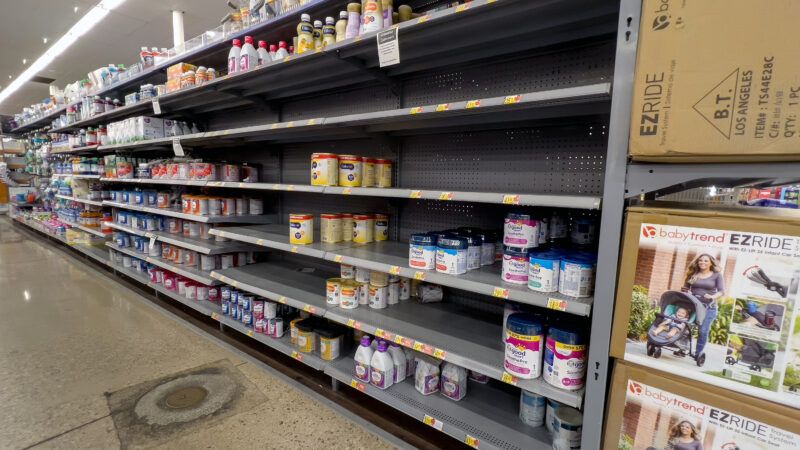The Government Hasn't Learned a Thing From the Baby Formula Shortage
With the FORMULA Act soon to expire, the U.S. baby formula market is about to return to the conditions that left it so vulnerable to a shortage in the first place.

Earlier this year, a baby formula shortage caused panic around the nation. While temporary FDA approval of several foreign brands helped to increase formula supply, millions of families could soon be thrown back into uncertainty as the FORMULA Act, which eliminated tariffs on formula imports, is set to expire at the end of this month.
The expiration of the FORMULA Act will mark a return to an anti-market policy which is likely to rapidly increase the price of imported baby formula. As U.S.-manufactured formula supplies are still down—though notably better than during the height of the shortage—the return of tariffs could soon cause a major uptick in the number of families struggling to find enough formula to feed their children.
A baby formula shortage gripped the nation starting in February of this year, after a major U.S. formula manufacturer issued recalls on three of its products and shut down its largest plant. At its peak 10 states faced out-of-stock rates of 90 percent or higher. At first, the formula shortage was exacerbated by existing FDA regulations, whose labyrinthine label and ingredient rules effectively prevented formula imports—even imports from the European Union, whose health requirements on formula are more up-to-date than U.S. regulations.
However, in May, the FDA announced that it would begin using "discretion" when enforcing its formula label requirements, leading to eight foreign companies receiving approval for their baby formula. When the FORMULA Act passed two months later, eliminating tariffs on imported formula, the supply of foreign baby formula continued to rise.
While it's difficult to say for certain that imported formula alleviated the shortage, as the closed Abbot formula factory restarted manufacturing at nearly the exact same time, the Biden Administration itself has credited foreign formula as a major reason that the crisis ended.
While the baby formula shortage has been past critical levels for several months, formula supplies remain strained, even with increased imports. "It is a far cry from the full-on crisis that existed in, say, July of this year, when a lot of store shelves were empty," Scott Lincicome, the director of the Herbert A. Stiefel Center for Trade Policy Studies at the Cato Institute told Reason, "Now for most folks out there, your local CVS might have a limited supply of formula, you might have a few specific brands or types out online, but in general you're gonna be able to make do."
This status quo is set to end shortly. The FORMULA Act will expire at the end of the year, and while the FDA will allow select formula imports until October 2025, foreign companies will be subjected to high tariffs on their product, causing price increases and likely shortages of the imported formula that so many families now rely on.
"Any time you add a tax of approximately 25 percent, some of that's gonna get passed onto consumers, and domestic prices will adjust upward to match the import prices," Lincicome told Reason. "And the second thing is, any time you add a tax of that level, you're gonna get less supply. Consumers and importers, retailers in the rest of the United States will try to avoid importing more formula if they can because there's gonna be less demand for it, cause it's gonna be expensive."
Thus, instead of learning from this year's shortage and liberalizing the baby formula market to allow for more imports, the Biden administration seems set to allow the FORMULA Act to expire—allowing the market to begin returning to the same regulatory regime that made U.S. baby formula supplies so vulnerable to a shortage in the first place.
"We're essentially going right back to the screwed-up market we had," Lincicome told Reason. "We have a domestic market that's highly concentrated, and a wall that prevents import supplies, to potentially diversify a bit. And the result is, when you have a single factory closure, you essentially cripple the who market, if not collapse it."
Unnecessary regulations on baby formula imports are what caused this year's dire formula shortage in the first place. Even with supplies approaching normalcy, levying high tariffs on foreign baby formula leaves U.S. supplies at risk for another shortage—and millions of families hanging in the balance.


Show Comments (64)